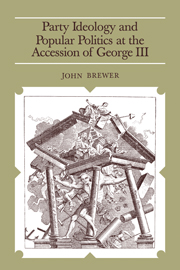8 - The press in the 1760s
Published online by Cambridge University Press: 15 December 2009
Summary
The first thing we lay our hands on in the morning is a libel; the last thing we lay out of our hands in the evening is a libel. Our eyes open upon libels; our eyes close upon libels. In short, libels, lampoons and satires, constitute all the writing, printing, and reading, of our time.
(Lord North, Parliamentary History XVI, 1165–6)We may suppose that the press, and the print-shops will swarm with productions both grave and comic: That venal rhetorick, will turn prostitute in the service of disappointed ambition; and that buffonry [sic], capped like an ideot [sic], will ring her bells, to tickle vulgar ears, with the silly chimes of ridicule.
(Con-Test XXXVI, 18 June 1757)Almost every discussion of the controversy that contemporaries believed was the dominant feature of the politics of the 1760s ascribed an important role to the press in the growth of contention. For nearly all eighteenth-century Englishmen believed that England's position as a nation that enjoyed a free constitution, a free press, liberty, leisure and wealth enabled its citizens to enjoy a greater depth of political knowledge and extent of political information than was possible in any other country. The British constitution was credited with the encouragement of the press, political knowledge and polemic:
In unlimited monarchies, men have neither inclination, ability, nor spirit to write; but in a well-constituted free State, the possession of property, the love of liberty, the cultivation of science, will necessarily produce freedom of inquiry, and maintenance of rights: Hence must result literary contentions, and the various opinions of different parties.
- Type
- Chapter
- Information
- Publisher: Cambridge University PressPrint publication year: 1976
- 1
- Cited by



